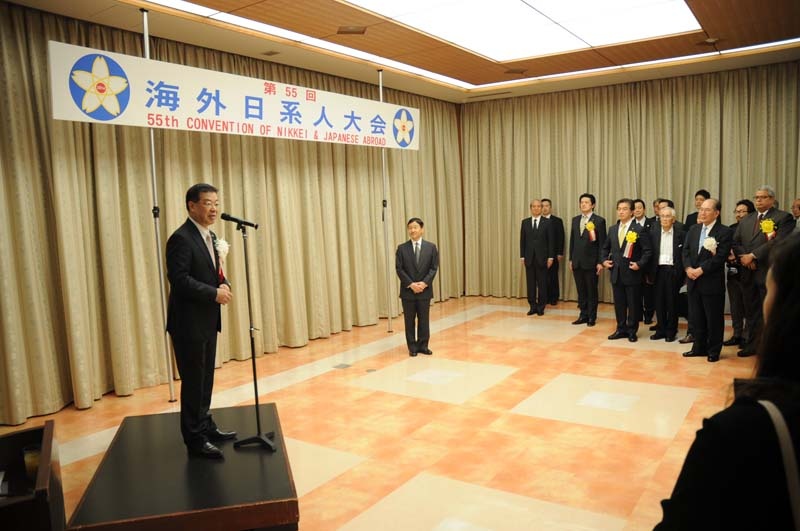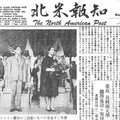As previously reported in our newspaper (Hokubei Hochi), the 55th Convention of Japanese People Abroad was held in Tokyo from October 22nd to 24th. With the theme of "Japanese Society Overseas Creating Japanese Culture - The Potential Strength Shown in the Development of Washoku," the event introduced the world of traditional washoku and the cutting edge of washoku overseas, where it has been passed down to Japanese people and is evolving into a new culture. It was a place for interaction between members of the Japanese community overseas who are contributing to the spread of Japanese culture overseas, with a focus on washoku, which has been designated an intangible cultural heritage by UNESCO.
* * *
This year, 140 people participated from 22 countries and one region. Five people, including our reporter, came from Seattle. The most numerous were from Brazil with 53 people, the United States with 22 people, and Peru with 16 people. This year, the Crown Prince attended the welcome reception on the first day.
The purpose of the conference is for people of Japanese descent living overseas to gather in their home countries, to mutually understand the realities of their countries of residence, and to deepen international exchange, understanding, and friendship, as well as to promote and strengthen understanding of Japan. From the first conference to last year, a total of 18,778 people have participated.
The festival's origins lie in the Japanese community during World War II. During the war, Japanese-Americans sent comfort items such as miso paste, soy sauce, and Japanese language books to Japanese-American internment camps and detention centers through the Red Cross. After the war, Japanese-Americans in the United States witnessed the chaos of defeat and the shortage of food and daily necessities in Japan, and from 1946 to 1952, they sent powdered milk and other food and clothing to express their gratitude for the comfort items they received during the war.
The total amount of supplies provided by LARA, an Asian aid organization formed mainly by American Christian groups and labor unions, was said to be over 40 billion yen in 1952, with about 20% coming from Japanese Americans.
When Japan joined the United Nations in 1956, the Nikkei Overseas Friendship Conference was held the following year, mainly by members of the Diet, to comfort the Japanese who had suffered so much and to express gratitude for the support they received through the LARA Goods. From the second conference in 1960, the name was changed to the Nikkei Overseas Conference, and since the third conference in 1962, the conference has been held every year.
Declaration of the 55th Convention of Japanese People Overseas
We, representatives and volunteers of Japanese descendants from all over the world and in Japan, held the 55th Convention of Japanese Descendants Abroad in Tokyo over three days from October 22nd to 24th, 2014. Under the overall theme of "Japanese Descendants Overseas Creating Japanese Culture: The Strength Revealed in the Development of Washoku," we held discussions in the following three subcommittees:
1. Inheritance and development of Japanese culture
2. Nikkei Community and Business Collaboration
3. Japanese youth as new human resources
As a result of the subcommittees and general meeting, we hereby declare, in the name of the Conference, that the following seven items have been resolved:
resolution
1. We strive to preserve Japanese culture, and we are particularly proud of the Japanese food culture that has been accepted overseas and continues to evolve, and we continue to hone our creativity.
The familiar Japanese food (washoku) is an unforgettable taste of home. Food is one of the biggest concerns in the lives of people who emigrate overseas. Our forebears had a hard time obtaining Japanese ingredients, and they used many creative methods to recreate Japanese food. However, Japanese food gradually attracted the interest of people in their new home countries, and became an excellent tool for helping people understand Japanese culture. Today, "Japanese cuisine" is accepted without any sense of incongruity and is highly regarded around the world.
Our position as Japanese people overseas is not necessarily to try to make the "Japanese cuisine" that has developed during the process of immigration closer to Japanese food. Rather, we want to highlight how "Japanese cuisine" has taken root in local communities through various creative adaptations in daily meals, and has contributed to the understanding and dissemination of Japanese culture through Japanese festivals and celebratory occasions at home. Last year, Japanese food culture was registered as an intangible cultural heritage by UNESCO, which is a source of pride for us living overseas. We will continue to demonstrate the creativity reflected in the development of Japanese food in our respective countries, while respecting and utilizing the culture of "washoku."
2. We, the Japanese people, will cooperate as partners with Japanese companies expanding overseas from Japan.
Japan, with its strong ethnic monopoly, has a tendency to be weak in working together with people of different religions and different ideologies to achieve something. On the other hand, we Japanese people have produced many excellent human resources who have combined the cultures of the countries to which we have immigrated with the Japanese culture. As Japanese companies become more multinational, Japanese entrepreneurs, lawyers, certified public accountants, and others are already widely cooperating with Japanese companies.
We feel that the active participation of Japanese descendants like these has become even more important for Japan to be able to overcome the fierce competition with other countries. While large Japanese companies are actively expanding overseas, small and medium-sized enterprises are not necessarily doing so actively. We, Japanese descendants and Japanese descendant communities, should be able to be good partners in companies expanding overseas. We would like you to turn your attention to Japanese descendant communities, particularly in Latin America, as a destination for expansion. We will cooperate with companies in holding seminars for expanding into Latin America and in accepting Japanese descendant trainees, and will spare no effort in supporting Japanese companies expanding into Latin America.
3. Nikkei Youth will promote the Japanese culture they have acquired while growing up in a multicultural society, and contribute to the development of international business.
Nikkei youths have the multicultural ability to be familiar with both Japanese and their home cultures, and so they can play an important role in bridging the gap between the two countries. When Japanese companies expand overseas, they can act as a bridge between Japan and their home countries, conveying Japanese culture and customs and leading businesses to success. One example of this is the promotion of Japanese cuisine, which was featured in this conference, and they can provide various ideas and ingenuity to Japanese food-related companies expanding overseas.
The areas in which Japanese youth can contribute include a wide range of fields, from working to promote Japanese culture in their own countries, to working for Japanese companies that have expanded into the country, and even promoting international business exchanges. There is still a tendency in many Japanese companies to treat Japanese people as "handymen who can speak Japanese," but we strongly urge that the abilities and Japanese language skills of Japanese people be properly evaluated.
4. We again ask the Japanese government for their understanding in recognizing dual nationality
For the first generation of Japanese who have acquired foreign citizenship, the provision regarding the loss of Japanese nationality, which states that "a Japanese national loses Japanese nationality when he or she acquires a foreign nationality of his or her own choice," trumps our desire to remain part of the community as Japanese people.
Regarding those with dual nationality, we again ask the government for their understanding to consider them as nationals of the country of their nationality and to recognize them as Japanese nationals.
On the other hand, there are cases where people who legally became dual nationals before the revision of the Nationality Law, as well as minors, are unable to apply for government-sponsored study abroad programs or purchase Japan Tourist Rail Passes. We also call for improvements to this treatment.
5. We hope that the Japanese government will continue to directly communicate information to people of Japanese descent overseas.
Since the inauguration of the Abe administration, the Prime Minister has been making more frequent visits abroad, and the results of his meetings with heads of state, prime ministers, and key cabinet members, as well as his messages to Japanese people and organizations, have been conveyed in detail through Japanese-language newspapers published in each country. We are also very encouraged by the increased opportunities for Prime Minister Abe to interact with Japanese people and organizations in the countries he visits. We hope that these opportunities will continue, and we also hope that overseas public relations will be strengthened.
6. Spread "Cool Japan" through cultural events such as the Japan Festival
We hold events called Japan Festivals and Japanese Culture Weeks in various countries around the world. When they first started, many of them consisted of Bon Odori dances and night market stalls mainly performed by Japanese people, but today, as seen in the "Japan Festival" in Sao Paulo and the "Nisei Week" in Los Angeles, more and more of these festivals are positioned as important festivals in the host city. They are also a place where many ordinary citizens participate and experience "Cool Japan." As people gain a greater understanding of Japanese culture, they also develop an eye for the real thing, and there are limits to what we can achieve through our own efforts alone.
We hope that the Japanese government and prefectures across the country will actively support Japan events planned and run by people of Japanese descent, and encourage them to participate in and make use of these events.
7. As a country that touts itself as a tourism-based nation, we call for the liberalization of tourist visas.
As Japan aims to increase the number of foreign tourists to 20 million, we ask that the government of Japan promote the liberalization of tourist visas. In particular, Brazil is home to the largest Japanese community, and with the Japan-Brazil Olympic and Paralympic Games scheduled for 2016 and 2020, we urge the Japanese government to consider this as soon as possible.
*This article is reprinted from the November 13, 2014 edition of the North American Post (Vol. 69, Issue 46).
© 2014 The North American post






